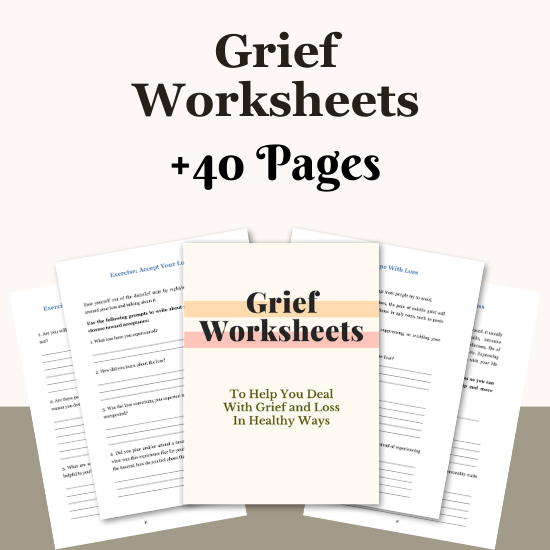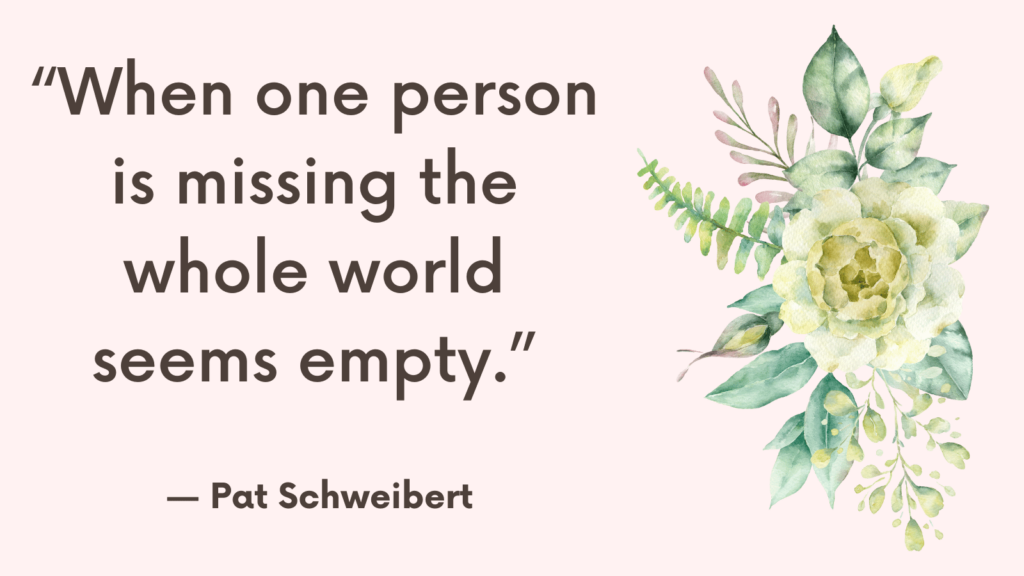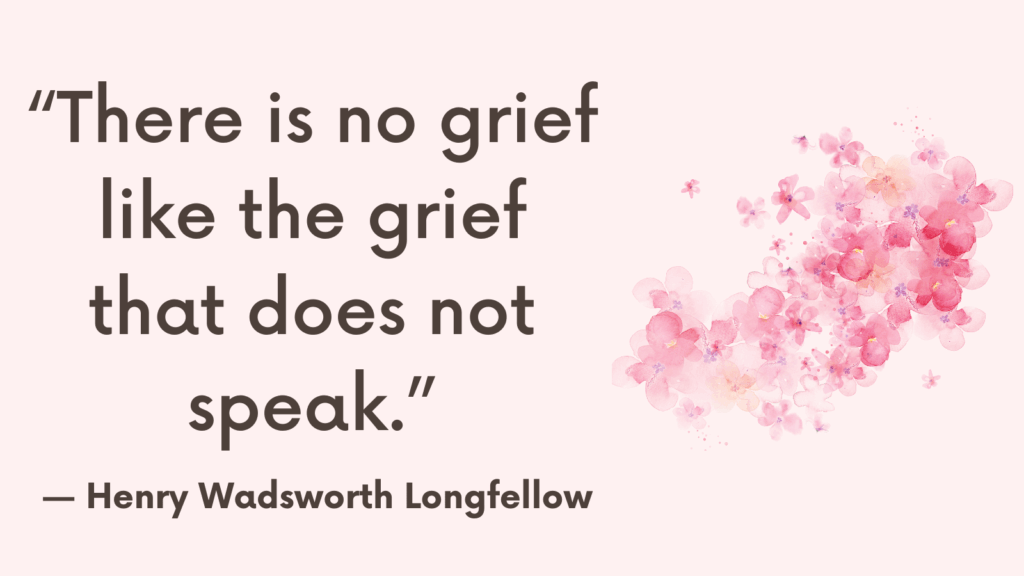The holiday season can be a challenging time for those who are grieving, as memories and traditions often highlight the absence of loved ones.
Here are some compassionate ways to navigate grief, honor memories, and find moments of comfort during this emotional time.
10 Tips on Coping with Grief During the Holiday Season
1. Allow Yourself to Feel Your Emotions
Grief is complex, and it’s natural for emotions to ebb and flow, especially during the holidays. Giving yourself permission to feel whatever arises—sadness, anger, joy, or nostalgia—can be a valuable part of the healing process.
– How to Practice: Take moments to check in with yourself, acknowledging any emotions you feel. If you need to cry, reminisce, or even take time alone, allow yourself the space to do so without judgment.
Related: Best 21 Grief Journaling Prompts (+FREE Grief Worksheets PDF)
2. Honor Their Memory with a Tribute
Creating a simple tribute to your loved one can bring comfort and keep their memory present in your holiday experience. Personal tributes can be as small or elaborate as you like, and the act of honoring them can feel deeply meaningful.
– Ideas: Light a candle in their memory, hang a special ornament, cook their favorite holiday dish, or share stories about them. You could also dedicate time to a cause they cared about, such as volunteering or making a small donation.
Related: Best +30 Grief Activities For Adults (+FREE Worksheets PDF)
3. Adjust Traditions if Needed
Holidays are often filled with traditions, but some may feel overwhelming or too painful during grief. Give yourself permission to alter or skip traditions that feel difficult and create new ones if you’re ready.
– Tip: Consider adjusting traditions to match your comfort level. For example, if big gatherings are too much, try smaller gatherings or celebrate with close friends. You may also add a new tradition that honors your loved one, helping bring healing to the season.
Related: Grief Comes In Waves: Top 12 Lessons From Grief No One Talks About
4. Plan for Emotional Triggers
Certain holiday activities, songs, or places may trigger intense emotions. Thinking about these in advance and planning ways to cope with them can help you feel more prepared and in control.
– How to Prepare: Make a list of any potential triggers, like a specific family recipe or song. Decide on ways to cope, whether by taking a break, leaning on a friend, or having an alternate plan in place.
Related: How To Help A Grieving Parent? (+FREE Worksheets For Grief)
5. Connect with Supportive People
Being around supportive friends or family members who understand your grief can help you feel less alone. Choose to spend time with people who respect your emotions and create a safe space for you to express yourself.
– Tip: Communicate with your support circle about how you’re feeling and let them know what you might need. This could include company, talking about your loved one, or simply sitting in silence together.
6. Take Time for Self-Care
Self-care is essential when you’re grieving, as it helps replenish your energy and provides comfort during tough times. Simple self-care practices can ease stress and help you manage your emotions.
– How to Practice: Try a daily self-care ritual, like taking a warm bath, practicing deep breathing, journaling, or going for a walk. Prioritize these moments, especially when you feel low, to maintain your mental and emotional well-being.
Related: Resilient Grieving: Best 17 Ways To Manage Grief In The Workplace (+FREE Grief Worksheets)
7. Engage in Acts of Kindness
Helping others can bring a sense of purpose and lift your spirits. Doing something meaningful in your loved one’s honor can turn grief into a positive act that benefits others.
– Ideas: Consider volunteering, donating to a cause your loved one cared about, or performing small acts of kindness, like giving to a neighbor in need. These acts can help shift focus outward and create moments of joy amid grief.
Related: Grieving Someone Who Is Still Alive – Ambiguous Grief
8. Create a Safe “Escape Plan”
Holiday gatherings can sometimes feel overwhelming or bring unexpected emotions. Having a plan for when you need a breather or a quick exit can offer relief.
– How to Plan: Drive yourself to gatherings if possible, or tell a friend that you may need to leave early. Knowing you have an exit strategy can help reduce anxiety and give you the freedom to take care of yourself.
Related: How Do Widows Cope With Loneliness? Top 10 Ways
9. Seek Professional Support if Needed
Sometimes, grief during the holidays can feel particularly intense. Speaking with a counselor or therapist can offer guidance and coping strategies, especially if the pain feels too heavy to manage alone.
– Tip: Reach out to a grief counselor, therapist, or support group. Many communities and online platforms offer bereavement support specifically around the holidays, where you can find understanding and shared experiences.
Related: Top 6 Ways Grief Show Up In The Body
10. Give Yourself Permission to Find Moments of Joy
Grief can bring feelings of guilt when we experience joy or laughter. Remember that finding joy doesn’t diminish your love for the person you lost; it’s a part of life’s balance and healing process.
– Tip: Allow yourself to enjoy small moments, whether it’s watching a favorite holiday movie, eating a favorite treat, or connecting with loved ones. These moments of joy can coexist with grief and may even bring healing.
Related: How to Cope With Losing a Pet Suddenly? (+Resources for Pet Grief)

Why the Holidays Can Intensify Feelings of Grief
1. Holidays Are Tied to Shared Memories
The holidays are filled with traditions, rituals, and familiar routines that often included the person you’ve lost. Their absence is felt more strongly during moments you once shared — decorating the house, cooking a favorite dish, or watching a holiday movie. These small details bring their memory vividly into focus, and the contrast between past joy and present loss can be especially painful.
2. The World Keeps Celebrating
While you may be grieving, the world around you is filled with music, lights, parties, and smiling faces. The pressure to participate or feel cheerful can create a disconnect between your internal experience and external expectations. This emotional mismatch can make you feel even more alone in your grief.
3. There’s Less Distraction and More Reflection
Holidays slow down the normal pace of life. Work schedules change, routines pause, and there’s more unstructured time — which leaves space for grief to rise to the surface. You may find yourself reflecting on who or what you’ve lost, whether you planned to or not. The emotional quiet can bring old wounds closer to awareness.
4. Family Gatherings Can Highlight Who’s Missing
Sitting down at a holiday meal or gathering can be a painful reminder of the absence in the room. A missing seat at the table, a quiet space where someone’s laughter used to be — these visible absences often bring grief into sharp relief, even if others are trying to carry on as usual.
5. There’s Pressure to Be “Okay”
Many people feel they have to put on a brave face for others during the holidays — especially if they’re trying not to “ruin” the mood for family or friends. This emotional masking can lead to deeper exhaustion, as you suppress your grief instead of expressing it in healthy ways. Feeling like you can’t grieve openly adds another layer of isolation.
6. Grief Doesn’t Follow a Calendar
Grief isn’t something that disappears with time. Even years after a loss, the holidays can unexpectedly reignite feelings of sadness, longing, or anger. Just because a significant amount of time has passed doesn’t mean the pain goes away — especially when a season is so strongly linked to memory, meaning, and togetherness.
Conclusion
Grieving during the holidays is deeply personal, and there’s no “right” way to experience it. Being gentle with yourself, honoring your loved one in ways that feel meaningful, and seeking support when needed can help you navigate this season with compassion. It’s okay to take it one day at a time, and you don’t have to do it alone.



